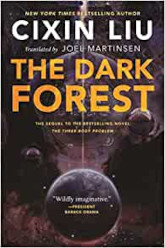I had low expectations from “The Dark Forest”, a science-fiction novel by Cixin Liu, since I had been disappointed by the first book in the “Remembrance Of Earth's Past trilogy of books. The only reason I started reading this book was because I am a sucker for closure – I had to read the rest of the books in the trilogy once I had started reading its first book. I am happy to report that this book turned out to be much better than I had expected.
The book is set in the so-called “Crisis Era” on Earth in the near future, that follows the revelation from the first book of a fleet of alien ships from the nearby Trisolaris system that is headed towards Earth in order to destroy the human civilization. Due to vast distance between the two systems, the fleet of alien ships would take about four centuries to arrive here, giving humans some time to prepare themselves for the impending invasion. Their efforts are constantly thwarted by sub-atomic computers called “sophons” that have been sent to Earth by the aliens as well as an organization of humans sympathetic to the aliens that calls itself The Earth-Trisolaris Organization (ETO).
Despite these obstacles, the humans are able to make a lot of progress towards their defence and, for a while at least, look to have gained an upper hand on the incoming fleet of aliens. This delusion of the humans proves to be short-lived when a single, tiny probe from the aliens manages to destroy almost the entire fleet of spaceships from Earth in a spectacular display of the technical superiority of aliens. Is humanity doomed to perish after all? You have to read the book to find that out.
This book presents the central idea of this series of books based on what it calls the axioms of cosmic sociology. Given the finite resources in the universe, the imperative for life to survive, and the explosive pace of technological growth in a civilization, any contact between two civilizations in the universe is bound to result in the destruction of one of them due to a chain of suspicion (as the book calls it). This is its answer to the famous Fermi Paradox of extraterrestrial life.
Somewhat coincidentally, Kurzgesagt released this video recently on why we should not go around looking for aliens. Imagine my delight when I came across the same idea in the book that I was reading. However, I feel that they do not give proper credit where it is due. Only in a (pinned) comment on the video do Kurzgesagt acknowledge the origin of this theory in this book, which I found a bit odd – I would have expected this information to be prominently presented in the video itself or at least in the description of the video.
You have to have read the first book to make sense of this second book in the series, even though I found it to be far more interesting. Like the first book, I found the prose in this book quite stilted and the extreme China-centric narrative and the plethora of Chinese characters somewhat disorienting. As I noted earlier, the former might be an artifact of translation and the latter is a critical reminder of the typical US-centric narratives in popular culture.
After a break, I am looking forward to reading the last book in this trilogy.
